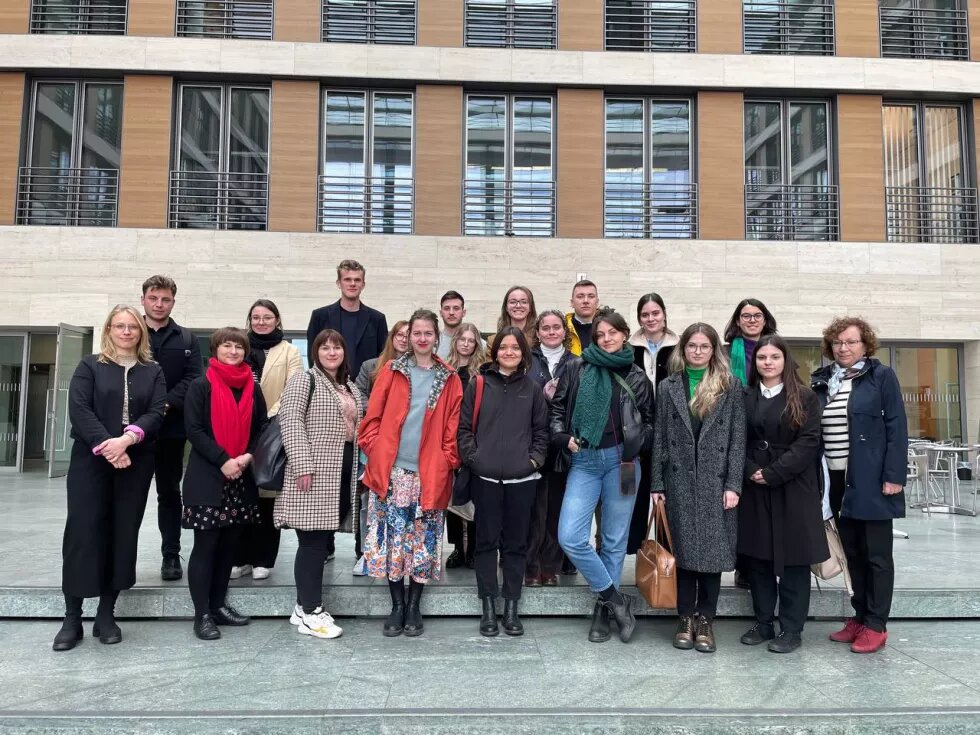
Students from Charles University in Prague who participated in the HBS study trip on “Feminist and Climate Foreign Policy” in Berlin write about why it is important not to blame the climate crisis on individuals and their consumer choices

In a world grappling with the urgent need to combat the climate crisis, the concept of the individual carbon footprint has gained significant attention. We are constantly bombarded with messages about reducing our personal carbon emissions, from driving electric cars to cutting back on meat consumption. How much does our individual carbon footprint really matter in the grand scheme of things, though?
The idea behind measuring individual carbon footprints is to hold each person accountable for their contribution to greenhouse gas emissions. It aims to encourage individuals to adopt more sustainable lifestyles and make environmentally conscious choices. However, the majority of global greenhouse gas emissions are not generated by individuals, but rather by industries and large-scale commercial activities. According to the Intergovernmental Panel on Climate Change (IPCC), around 70% of carbon dioxide emissions stem from just 100 companies worldwide. This staggering statistic highlights that individual efforts alone cannot single-handedly solve the climate crisis. Our personal choices do have an impact, albeit on a smaller scale. When individuals collectively adopt sustainable practices, it can create a ripple effect, influencing larger entities and prompting policy changes.
It is crucial to strike a balance between individual action and systemic change. While individuals should certainly strive to reduce their carbon footprints, it is equally important to address the systemic issues that contribute to climate crisis. Governments, corporations, and institutions must play their part by implementing policies that promote renewable energy, invest in sustainable infrastructure, and regulate emissions from major industries. Moreover, focusing solely on individual carbon footprints can lead to a sense of guilt and overwhelm, causing people to feel that their efforts are futile. Combating the climate crisis nevertheless requires collective action and systemic change. Individuals can support larger movements, engage in activism, advocate for policies that promote a low-carbon future and even strive to keep their own carbon footprint low. However, it is exactly the overestimation of the individual impact on the climate crisis that can lead to climate anxiety, especially among youngsters. As Jörg Haas, Head of the Globalisation and Transformation Division at the Heinrich Böll Stiftung notes, “I see a real problem with individualising the climate change problem,” adding that “when you feel guilty, you demobilize.” By working together, we can make a substantial impact on reducing global greenhouse gas emissions and mitigating the effects of the climate crisis.
In order to hear the political perspective of young activists on this issue, we interviewed Štefan Čikovský, the International Officer from the Youth Organization of the Slovak political party Progresívne Slovensko (Progressive Slovakia). Štefan is a climate activist whose party has been advocating the need to tackle the climate crisis for years now.
Q: Over the last couple of years, we have seen a great rise in the individualization of the carbon footprint. Nevertheless, we still see that around 100 companies are responsible for approximately 71 % of CO2 emissions globally. How do you perceive these numbers?
A: The generally-known fact regarding the popularization of the idea of a carbon footprint still has to be stated over and over: It started as an advertising campaign of BP, the British oil and gas company, and it is being used to this day to shift the blame away from fossil fuel companies and onto common people.
Leaving responsibility for the necessary change to the companies and fossil fuel industries in the hope that they will act with the environment in mind is naive, and political and societal changes have to be put into place to counteract this. Climate justice will not be achieved when thousands are literally dying from climate change-related catastrophes around the world while fossil fuel companies are banking record profits.
This is not to say that individual action does not have its value, though. As a greater and greater number of people, mainly the young, are leading more sustainable lives, “green” products and services have become more widely available and cheaper. Secondly, partaking in a more eco-friendly lifestyle can spur individuals into more actively demanding politicians and companies actually tackle the climate crisis.
Q: Carbon footprint individualization often leads to climate anxiety and demobilization, especially among youngsters. What would you say is a good strategy tackling these two responses and staying focused on advocating for climate justice?
A: As I stated previously, the main focus of the climate movement should be on the main emitters – the fossil fuel companies. Governments should be the ones to provide and support alternatives that allow for this change.
The way we talk about climate change should also include mentioning that sustainability yields many other benefits, such as energy independence from unreliable partners, cleaner and safer cities, and healthier lifestyles overall.
Furthermore, not all young people can afford to lead wholly sustainable lifestyles due to a number of factors, namely, accessibility and prices. Therefore, climate policies should also include support to these individuals so that we do not increase inequality and therefore demobilization, since some services and products are sure to increase in price due to higher taxes or reduced state subsidies.
Even if we change our rhetoric from “climate catastrophe” to “climate opportunity”, climate anxiety will still be present, which involves a wider, different political debate about the need for increased availability of mental health support facilities, mainly for the younger generation.
As we can see, the carbon footprints of individuals do play a role, but their impact is limited compared to industrial emissions. Addressing the climate crisis requires collective action and systemic change from governments, corporations, and institutions. The focus should be on holding major emitters accountable while providing support for sustainable alternatives in order to avoid exacerbating inequality and climate anxiety among the young.


